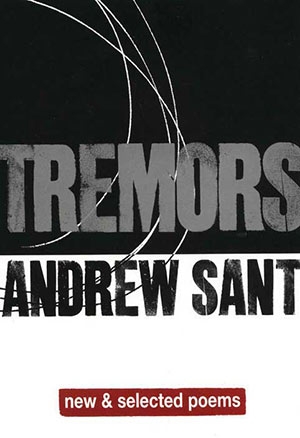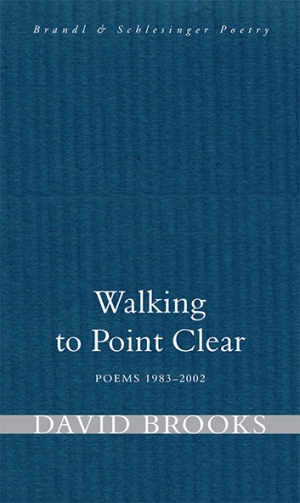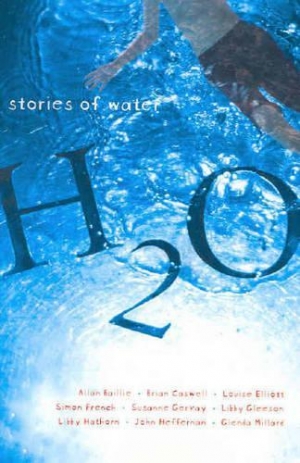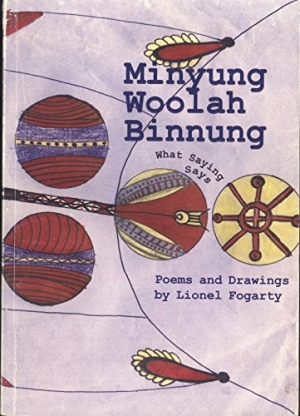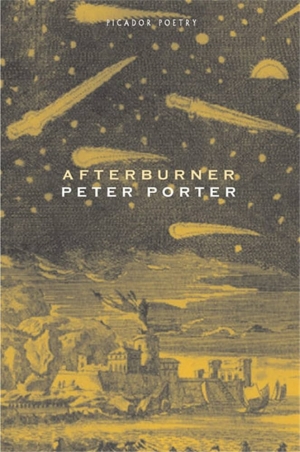Poetry
Paul Hetherington reviews ‘Tremors: New and selected poems’ by Andrew Sant
In ‘Glenlyon’, the opening poem of his most recent collection, Tremors: New and Selected Poems, Andrew Sant provides readers with clues about his approach to poetry. ‘Glenlyon’ speaks of the ‘cool light’ of the page and ‘my shadow’s / hovering vague shape’. Certainly, Sant’s presence is invested in much of his work and his poetry prizes coolness and clarity. While he is sometimes a passionate poet, this passion is rarely overt and it is balanced by a determination to make good argument out of his poetic material and by a characteristically reasonable tone.
... (read more)David Gilbey reviews ‘Walking To Point Clear: Poems 1983–2002’ by David Brooks
At first, many of these forty-eight poems from two decades struck me as almost self-indulgent and mundane: short lyrics about family life, eating, drinking, dreaming of Valparaiso, lemons, the Molonglo River; though there was often an underside of premonition, discontent, and a stillness that made me think I hadn’t really understood. In the first group, ‘One Hundred Nights’ bothered me: ‘When will it end / this waking / while others sleep, / this herding out on the ghost fields? / the flesh / whispering / its impossible desires / the bones / murmuring their Kali mantra / love, emptiness / love, emptiness.’ However, on my next reading, some of the second group struck me with autumnal clarity. From ‘Brown Pigeon’: ‘eyes / plucked out, feathers / scattered, / maggots / when I turn it over / writhing in the black mess near the heart’, where the image of the dead bird is an iconic memento mori.
... (read more)If I hesitate to declare delight in Blister Pack, David McCooey’s first volume of poetry, it may be because McCooey himself casts a shadow over the word in ‘Succadaneum’, a sequence of sardonically sad glimpses of the failed love that constitutes the theme of Part II of this collection – ‘Delight, it turns out, / is a lawyer / staying back at work / kicking off her shoes / and opening a bottle of red’, abandoning clients’ disasters to files ‘locked / in metal cabinets’.
... (read more)John Tranter reviews 'The Long Game and Other Poems' by Bruce Beaver
The Sydney poet Bruce Beaver died in February 2004 after a long struggle with kidney failure that kept him on dialysis for more than a decade. He was seventy-six years old. Beaver was seen as a sympathetic older figure by many poets of my generation, born a dozen years later. I met him when I was in my twenties, and found him to be a generous friend. When the poet Michael Dransfield, younger still, called on him in the early 1970s, it was a natural meeting of minds. In one poem in The Long Game and Other Poems, Beaver says that ‘poor Dransfield draped / me with a necklet of dandelions / once and kissed my forehead / in what must have been / a satirical salute’. I have a feeling that the salute was heartfelt, but Bruce was painfully modest.
... (read more)Sherryl Clark reviews ‘H2O: Stories of Water’ edited by Margaret Hamilton, ‘And the Roo Jumped Over the Moon: Australian Stories and Poems for Children’ edited by Robin Morrow & illustrated by Stephen Michael King and Poems By Young Australians Vol.2
Putting together a collection or anthology is not as easy as it looks. There are decisions to be made about theme, order and intent, which are often based on the intended audience. Three recent anthologies for children show that, in children’s literature at least, originality and diversity are achievable.
... (read more)Philip Harvey reviews ‘Unfinished Journey: Collected Poems 1932–2004’ by Michael Thwaites
Gentleman also write poems. Michael Thwaites, winner of the King’s Medal for poetry back in 1940, is resolutely old school: set subjects, square metrics, good manners. He is a quiet achiever. Even his voice is quiet, though not so quiet that you can’t hear it. Solid statements, with a minimum of flourish or divertimenti, are his rule.
... (read more)Peter Minter reviews ‘Minyung Woolah Binnung: What Saying Says’ by Lionel Fogarty and ‘Smoke Encrypted Whispers’ by Samuel Wagan Watson
These two exceptional books should be sent to every household in Australia free of charge. They would be a perfect curative after the federal election. The campaigns of the conventional parties demonstrated how far indigenous Australia has fallen off the political radar screen. Fortunately, the independent creative work of Aboriginal thinkers, writers and artists continues to set high standards and often leads the way in the exploration of social, political and philosophical issues that many in mainstream culture are still unable to face.
... (read more)In the opening poem of Virgil’s Eclogues, a shepherd newly dispossessed of his farm by a soldier returning from war exclaims: ‘There’s so much trouble everywhere these days. / I was trying to drive my goats along the path / And one of them I could hardly get to follow; Just now, among the hazels, she went into labor …’ (trans. David Ferry). More than 600 years later, Poussin’s painting, Les Bergers d’Arcadie, dit aussi Et in Arcadia Ego (1638–40), takes up the theme of dispossession in a more radical key: even shepherds in Arcadia must die. The pastoral mode (taken broadly to include anti- and post-pastoral) has always enveloped threats to the pastoral idyll. John Kinsella’s The New Arcadia – with Poussin’s painting on its cover – is the final instalment of an ‘anti-pastoral’ trilogy initiated by The Silo: A Pastoral Symphony (1995) and followed by The Hunt (1998). In The New Arcadia, as in its prequels, we find the pastoral mode in full-blown crisis: in modern Australia, nature’s small misfires (viz. the goat’s ill-timed birth) have escalated into ecological disaster. In The Hunt, the farmers and their families are killed by their own tools, dying in accidents, falling under tractors, shooting themselves; in The New Arcadia, on the other hand, most of the victims are native birds.
... (read more)Martin Duwell reviews ‘Avenues & Runways’ by Aidan Coleman, ‘Throwing Stones at the Sun’ by Cameron Lowe, and ‘Narcissism’ by Maria Takolander
Each of these three books is its author’s first, and each carries a cover endorsement by two distinguished poets. You can tell a lot about the books from looking at who endorses whom before you need even to read one of the poems.
The rear cover of Aidan Coleman’s Avenues & Runways (endorsements by Kevin Hart and Peter Goldsworthy) describes him as an imagist. Whatever the exact significance of that term, there is no doubt that this poetry belongs to the class that has slight outward show and rich implications. And the pleasure of reading them is the shuttling between the two. There are at least two important requirements here: the surface has to be elegant and engaging without being slovenly or cute (ah, if you only knew what treasures I conceal!); implications must be intense and never clichéd.
... (read more)Since a new book by Peter Porter is, though precious, also a complex phenomenon, one is stuck with the question of where to begin. The title poem, ‘Afterburner’, is perhaps as good a place as any. It is one of those poems (‘Clear Air Turbulence’ is another in this book) that speculates autobiographically and revisits youth looking for patterns and understandings:
... (read more)
